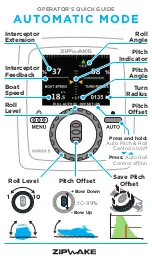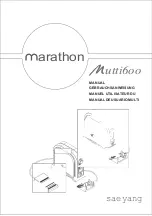
5
English
GENERAL OPERATIONAL PRECAUTIONS
WARNING!
When using electric tools, basic safety
precautions should always be followed to reduce the
risk of fire, electric shock and personal injury, including
the following.
Read all these instructions before operating this product
and save these instructions.
For safe operations:
1.
Keep work area clean. Cluttered areas and benches
invite injuries.
2.
Consider work area environment. Do not expose
power tools to rain. Do not use power tools in
damp or wet locations. Keep work area well lit.
Do not use power tools where there is risk to cause
fire or explosion.
3.
Guard against electric shock. Avoid body contact
with earthed or grounded surfaces. (e.g. pipes,
radiators, ranges, refrigerators).
4.
Keep children away. Do not let visitors touch the
tool or extension cord. All visitors should be kept
away from work area.
5.
Store idle tools. When not in use, tools should be
stored in a dry, high or locked up place, out of reach
of children.
6.
Do not force the tool. It will do the job better and
safer at the rate for which it was intended.
7.
Use the right tool. Do not force small tools or
attachments to do the job of a heavy duty tool. Do
not use tools for purposes not intended; for example,
do not use circular saw to cut tree limbs or logs.
8.
Dress properly. Do not wear loose clothing or
jewelry, they can be caught in moving parts. Rubber
gloves and non-skid footwears are recommended
when working outdoors. Wear protecting hair
covering to contain long hair.
9.
Use eye protection. Also use face or dust mask if
the cutting operation is dusty.
10.
Connect dust extraction equipment.
If devices are provided for the connection of dust
extraction and collection facilities ensure these are
connected and properly used.
11.
Do not abuse the cord. Never carry the tool by the
cord or yank it to disconnect it from the receptacle.
Keep the cord away from heat, oil and sharp edges.
12.
Secure work. Use clamps or a vise to hold the work.
It is safer than using your hand and it frees both
hands to operate tool.
13.
Do not overreach. Keep proper footing and balance
at all times.
14.
Maintain tools with care. Keep cutting tools sharp
and clean for better and safer performance. Follow
instructions for lubrication and changing
accessories. Inspect tool cords periodically and if
damaged, have it repaired by authorized service
center. Inspect extension cords periodically and
replace, if damaged. Keep handles dry, clean, and
free from oil and grease.
15.
Disconnect tools. When not in use, before servicing,
and when changing accessories such as blades,
bits and cutters.
16.
Remove adjusting keys and wrenches. Form the
habit of checking to see that keys and adjusting
wrenches are removed from the tool before turning
it on.
17.
Avoid unintentional starting. Do not carry a plugged-
in tool with a finger on the switch. Ensure switch is
off when plugging in.
18.
Use outdoor extension leads. When tool is used
outdoors, use only extension cords intended for
outdoor use.
19.
Stay alert. Watch what you are doing. Use common
sense. Do not operate tool when you are tired.
20.
Check damaged parts. Before further use of the
tool, a guard or other part that is damaged should
be carefully checked to determine that it will operate
properly and perform its intended function. Check
for alignment of moving parts, free running of
moving parts, breakage of parts, mounting and any
other conditions that may affect its operation. A
guard or other part that is damaged should be
properly repaired or replaced by an authorized
service center unless otherwise indicated in this
handling instructions. Have defective switches
replaced by an authorized service center. Do not
use the tool if the switch does not turn it on and off.
21.
Warning
The use of any accessory or attachment, other than
those recommended in this handling instructions,
may present a risk of personal injury.
22.
Have your tool repaired by a qualified person.
This electric tool is in accordance with the relevant
safety requirements. Repairs should only be carried
out by qualified persons using original spare parts.
Otherwise this may result in considerable danger
to the user.
PRECAUTIONS ON USING PORTABLE REBAR
CUTTER/BENDER
WARNING!
1.
Be sure to use the unit with the rated voltage
specified on the nameplate. Use of the unit at a
voltage exceeding the specification on the
nameplate can result in a dangerously high rotation
speed and injury.
2.
Avoid any work exceeding the maximum capacities
of the unit described in the specifications. Never
cut and/or bend any hard materials such as
PC(Precast concrete) steel, etc. Materials of this
type are likely to scatter into pieces and cause
injuries.
3.
If the unit malfunctions during operation or you
hear any abnormal noise, immediately turn off the
switch and stop operation. Contact the store where
you bought the unit or a Authorised Hitachi Servise
Center, and ask for checkup and/or repair. Use of
the unit without checkup and repair can result in
injury.
4.
Make absolutely sure that the cutter cover is closed
when you don’t carry out the cutting work. If the
cover is kept open, the cutter can jam on foreign
objects and cause serious accidents. (
Fig. 1
.)
5.
While turning switches, never put your hand close
to the cutter, reaction stopper, or bending roller.
Bringing your hand close to these components can
result in serious injury.
6.
If you accidentally drop the unit or knock it against
something, thoroughly examine the unit and ensure
that there are no damages, cracks, or deformations
on the cutter and unit.







































